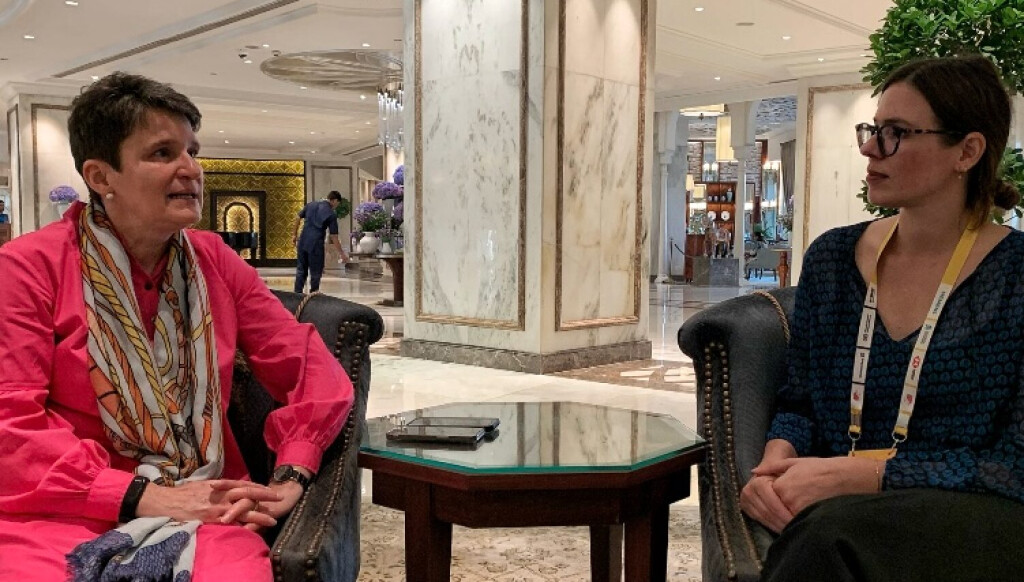'Even private companies in China are increasingly critical of state-owned companies'

Tanja Goenner, Director General at the Federation of German Industries (BDI), visited China before traveling to New Delhi. She felt that she was met with open ears during her talks. She takes a sporting view of competition between German and Chinese companies in the Asian markets – as long as everything is fair.
Mrs Goenner, you were in China before you came to the APK. What impressions did you bring back with you?
Three things: The Chinese economy and the Chinese government welcomed the BDI's visit from Germany. China continues to have a keen interest in good relations with Germany and Europe. And ultimately, in all the talks I had, I spoke in a friendly but firm manner about the concerns of the German economy, especially concerning market access and distortion of competition. And this was certainly met with interest. I have the impression that there is a desire to be perceived differently, as a partner and not just as a systemic rival.
How does this show?
There is no direct open discussion about systemic competition; it has been more paraphrased. We need to rebalance cooperation and competition. This requires a "coo-petition," i.e., a combination of cooperation and competition. In some areas, cooperation makes sense; in others, we are in competition – both require clear framework conditions.
So, where does the BDI see the biggest issues at the moment? And how was the response?
German companies face many informal hurdles. For example, the central government has issued supposed regulations not being enforced by the provinces. We are also dealing with a state-controlled hybrid economy. The subsidies that the state grants to state-owned companies, but also to private companies, distort competition. What is interesting for us is that even private companies in China are increasingly critical of this because they are, of course, also in competition with state-owned companies. There is no fair competition for them either. After all, private companies account for 60 percent of GDP and almost 80 percent of jobs in China. Another point is that the awarding procedure of public contracts in China is simply still not transparent.
How was the response to these talks? Are promises made, and how seriously can these promises be taken?
We were signaled that they were aware of the issues and that they understood that they were important to our companies. It would be naïve to believe we will receive immediate promises of change. Beijing knows perfectly well that it can only maintain its economic growth if there is both foreign investment in China and market access for its own companies overseas.
How do you see China here in the Asia-Pacific markets? Also in terms of competition with German companies?
German companies compete with Chinese suppliers, and we often cannot win the price war against China. That's why we must be as innovative as we are more expensive. However, German companies have never shied away from fair competition. And even if we may not be able to compete with the price, other things have always made us competitive, above all, our quality. The decisive question is: is it fair competition? If you have companies that have primarily received their research and development through state support or have built up production capacities in this way, then it is extremely difficult to compete. However, it is at least understandable that China sees the Asia-Pacific region as its sales market.
We are now in India, and some voices make it sound like the country is now the Holy Grail for German de-risking. Are we expecting a little too much?
India is undoubtedly a key growth market. However, there are many countries in this region with which we would like to work even more closely. These include Japan, South Korea, Singapore, Malaysia, Thailand and Indonesia as emerging economies, with many options for diversification and securing new market shares. However, you must always look at the infrastructure or bureaucracy individually and the potential for free trade with these countries. Whether India alone is the Holy Grail remains to be seen.
One final question about the ongoing negotiations on European tariffs on Chinese cars. The deadline is next week, on October 30. Have you been asked about this during your trip?
It would have been strange if it had not been mentioned. We are seeing a state-controlled hybrid economy that has simply given a large number of subsidies and is then entering into competition with our market economy system. Under these conditions, Europe must, of course, also think about defensive instruments. Europe can be self-confident because China is greatly interested in the European market. Our message has always been: please, yes, negotiations. Now the positions are on the table. And now both sides have to negotiate. There will only be losers if no negotiated solution is found.
Letzte Aktualisierung: 24. Juli 2025

